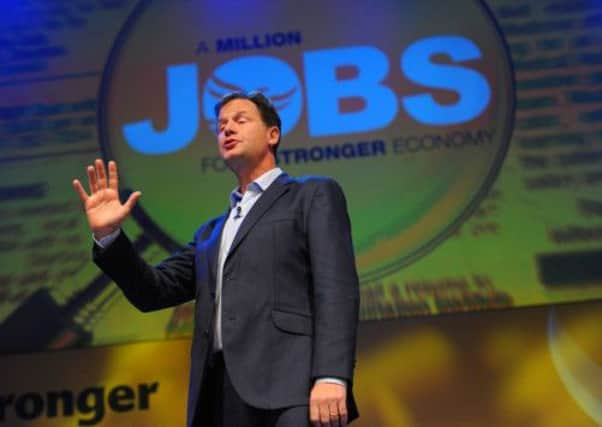Leader: Poll warning to unionist MPs | Good start


But political careers have been made and lost on less, and governments have risen and fallen. It could quite conceivably be the case that, come Scotland’s independence referendum in a year’s time, a swing of 5 per cent could decide whether the United Kingdom is to be dismantled or saved, and whether or not Scotland is to take its place in the United Nations chamber in New York, between Saudi Arabia and Senegal. As our ICM opinion poll shows today, that 5 per cent could well be in play if the pro-UK parties fail to offer Scottish voters a credible alternative to independence, that transfers significant new financial and welfare powers from London to Edinburgh.
This newspaper has, of late, been warning the No campaign not to be complacent. This poll finding is a perfect illustration of the reasons why. It is also a warning to those unionist MPs who would prefer to ignore the Scottish public’s undeniable desire for a stronger Holyrood. Such a bloody-minded attitude could carry a considerable political risk.
Advertisement
Hide AdAdvertisement
Hide AdToday’s poll will be a talking-point this weekend at the Liberal Democrats’ UK conference in Glasgow. The Lib Dems – and the Liberal Party previously – have always been in the vanguard of the Home Rule movement. Indeed, some of the most defining features of the modern devolution settlement are down to the Lib Dems’ influence on the debate – particularly the Scottish Parliament’s embrace of proportional representation.
The Lib Dems are a much-reduced force these days, and it is not hard to divine why. Allying themselves with the Conservative party in a Coalition government at Westminster was always a move that carried electoral risks, and nowhere more so than in Scotland, where the Liberal tradition is firmly on the centre-left. The party now has just five MSPs at Holyrood, and few observers expect all its 11 Scottish MPs to survive the next Westminster general election. But Clegg has an opportunity to do the Scottish people a service by being a strong advocate for the next stage of Scotland’s Home Rule journey. Which is why it is good to hear him arguing the case for all the UK parties committing themselves to new powers before the referendum vote. Another of Clegg’s comments is timely. The Lib Dem leader says Scotland’s next steps must not be “held hostage” by slow pace of constitutional change in England. This is about to become an important aspect of the debate on Scotland’s future, with many Labour politicians in particular arguing that new powers for Scotland will have to be negotiated as part of a complete redrawing of the British constitution.
This newspaper is wary of such an approach. The 1979 Claim of Right – the foundation stone of our devolved parliament, and a document that enjoys support across the entire political spectrum north of the Border – established “the sovereign right of the Scottish people to determine the form of Government best suited to their needs”. While new powers and funding arrangements would have to be ratified by Westminster, the next stage in Scotland’s journey has to be made in Scotland, as it was in the 1990s. It cannot be contingent on the ambitious aim of an all-singing, all-dancing, all-encompassing British constitution. Such an undertaking could take a decade. Scots must be the architects of the new Scottish politics, with our relationship with Westminster decided here in Scotland, on our own terms.
Good start
WHEN, back in July, Leo Cushley was announced as the new Catholic Archbishop of St Andrews and Edinburgh, to replace the disgraced Cardinal Keith O’Brien, this newspaper urged him to take his lead from the new Pope. We commended the example set by Pope Francis in rejecting much of the pomp and splendour of the pontificate in favour of a more simple and humble Christianity that made no apology for being on the side of the world’s poor and dispossessed. This we argued, was an appropriate model for the Church in Scotland, especially after the uncharitable bombast of O’Brien’s broadsides against gay people, itself eventually revealed as gross hypocrisy in the light of his eventual admission of inappropriate homosexual indiscretions.
It is heartening, therefore, to hear the new archbishop – in an exclusive interview in this newspaper today – make a small but symbolic gesture in this spirit. The traditional home of the archbishop of this diocese is St Bennet’s, a handsome stone mansion in the well-heeled Morningside area of the capital, with it’s own private Italianate chapel. Monsignor Cushley, quite rightly, says this is too big a home for one man, so it is to be home to an order of nuns as well. This is a good start. It would now be good to see the same generosity of spirit offered to 21st century Scottish society in all its diversity.